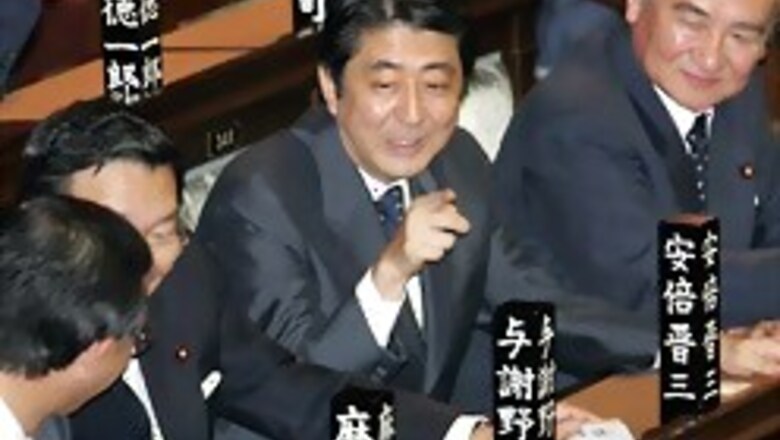
views
Tokyo: Shinzo Abe, an advocate of tighter ties with Washington and a bigger say for Japan in world affairs, was elected Japan's prime minister by parliament on Tuesday, becoming at 52 the youngest Japanese leader since World War II.
The hawkish Abe, a relative novice by Japanese political standards, faces the challenges of repairing ties with China -- frayed by predecessor Junichiro Koizumi's visits to Tokyo's Yasukuni war shrine -- and keeping economic reforms on track while addressing voter concerns about widening social gaps.
In a new cabinet announced later in the day, outspoken Foreign Minister Taro Aso, 66, who shares many of Abe's conservative views, kept his portfolio, while former defence minister Fumio Kyuma, 65, was named to the defence post.
Koji Omi, 73, a former economic planning agency chief, was named finance minister, while economics professor Hiroko Ota takes over as economics minister.
Abe, elected president of the governing Liberal Democratic Party last week by a two-thirds majority, bowed to applause after being chosen prime minister by parliament's powerful lower house.
A soft-spoken, popular lawmaker whose grandfather was also prime minister, Abe has pledged to rewrite Japan's pacifist constitution, boost Tokyo's role in global affairs, and revive respect for traditional values and pride in Japan's past.
He has also promised to nurture growth while pushing ahead with the economic reforms begun by Koizumi, and give precedence to spending cuts before tax rises in the struggle to rein in Japan's huge public debt, the biggest among advanced countries.
Koizumi -- one of Japan's most colourful and popular leaders -- smiled and waved after receiving a bouquet of flowers and applause in a ceremony at the prime minister's office, as the curtain fell on his sometimes tumultuous but rarely boring reign.
PAGE_BREAK
Koizumi, a media-savvy maverick known for snappy sound bites and cameo appearances with celebrities, stamped his mark on Japan's political scene after taking power in April 2001 with promises to pry his party loose from the grip of vested interests and lift government's heavy hand from the stalled economy.
Chinese problem
Ichiro Ozawa, leader of the main opposition Democratic Party -- which suffered a bashing in a September 2005 general election -- got 115 votes to Abe's 339 of the 476 votes cast in the 480 seat lower chamber.
Ozawa, 64, who suffers from heart problems, was hospitalised on Monday for health checks but attended the lower house session. Abe tapped Senior Vice Foreign Minister Yasuhisa Shiozaki, 55, a Harvard-educated former central banker, as chief cabinet secretary -- the premier's right-hand man and top government spokesman. Abe had held the post since last October.
Foreign Minister Aso keeps his top diplomatic portfolio as Beijing and Tokyo feel their way toward a possible thaw in ties. Aso has offended China and South Korea with remarks about Japan's colonial and wartime record in Asia. More recently, he has met senior Chinese diplomats for talks on a possible resumption of bilateral summits not held since April 2005 because of Koizumi's pilgrimages to Yasukuni, where Japanese leaders convicted as war criminals by an Allied tribunal are revered with war dead.
Kyuma replaces Fukushiro Nukaga in the defence portfolio; Omi takes over from Sadakazu Tanigaki in finance; and Ota succeeds Kaoru Yosano as economics minister.
Abe has already tapped pro-growth party heavyweight Hidenao Nakagawa, 62, for the post of LDP secretary general, the party's No. 2 post and de facto campaign manager, especially important as the LDP prepares for an upper house election next summer.
Abe, who won a cabinet post as chief cabinet secretary for the first time just a year ago, also chose veterans for other key party positions, including Shoichi Nakagawa as its policy chief. Shoichi Nakagawa, unrelated to Hidenao, has held the agriculture and trade minister portfolios.
He is known for his tough stance against China and North Korea and shares Abe's views on the desirability of putting patriotism back into school curriculums, a controversial proposal that critics say has echoes of wartime militaristic teaching.













Comments
0 comment